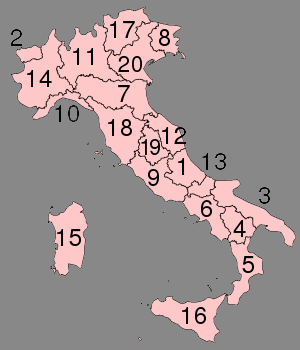Regions of Italy
| Region / Capital | |
|---|---|
| 1. Abruzzo (formerly Abruzzi) | L'Aquila |
| 2. Aosta Valley (Val d'Aoste, Valle d'Aosta) |
Aosta (Aoste) |
| 3. Apulia (Puglia, sometimes Puglie) | Bari |
| 4. Basilicata | Potenza |
| 5. Calabria | Catanzaro |
| 6. Campania | Naples (Napoli) |
| 7. Emilia-Romagna | Bologna |
| 8. Friuli Venezia Giulia | Trieste |
| 9. Latium (Lazio) | Rome (Roma) |
| 10. Liguria | Genoa (Genova) |
| 11. Lombardy (Lombardia) | Milan (Milano) |
| 12. Marches (Marche) | Ancona |
| 13. Molise | Campobasso |
| 14. Piedmont (Piemonte) | Turin (Torino) |
| 15. Sardinia (Sardegna) | Cagliari |
| 16. Sicily (Sicilia) | Palermo |
| 17. Trentino-South Tyrol (Trentino-Alto Adige/Trentino-Südtirol) |
Trento and Bozen-Bolzano |
| 18. Tuscany (Toscana) | Florence (Firenze) |
| 19. Umbria | Perugia |
| 20. Veneto | Venice (Venezia) |
The Regions of Italy were granted a degree of regional autonomy in the 1948 constitution, which states that the constitution's role is: to recognize, protect and promote local autonomy, to ensure that services at the State level are as decentralized as possible, and to adapt the principles and laws establishing autonomy and decentralization.
However, five regions (Friuli Venezia Giulia, Sardinia, Sicily, Trentino-South Tyrol, and Aosta Valley) have been granted a special status of autonomy to establish their own regional legislation on some specific local matters; based on cultural grounds, geographical location and on the presence of important minorities.
Each region has an elected council and a Giunta Regionale (executive committee) headed by a president (since 2002 called 'governor'). The Giunta is responsible to the council and is required to resign if it fails to retain the council's confidence.
The other 15 regions were established by various laws in 1970 and they primarily serve to decentralize the state government machinery, and recent administrations have devolved further powers to the regions. Many of the northern regions are seeking greater powers and autonomy. The regions are headed by a Commissioner who serves to co-ordinate the affairs and activities of the central government's apparatus.
Provincial and communal governments follow similar principles: councils and giunte headed by provincial presidents or communal mayors.
Regional autonomy (Federalism) has been made an issue in Italian politics in recent years, no doubt aided by the emergence of parties such as the Lega Nord.
